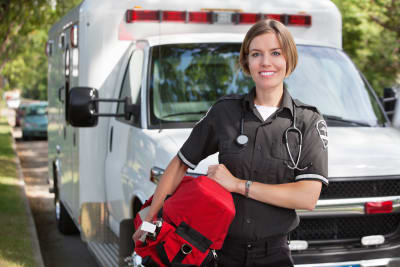Many of us have experienced having our blood drawn at least once or twice, quite frequently for others. A skilled medical professional should perform it carefully and precisely, whether it’s used for diagnostics or therapeutics. However, we have mistaken the nurse being the one carrying out this procedure. In reality, it is likely the phlebotomist that is performing this task. Phlebotomy is puncturing a vein to extract blood using a cannula. Being a phlebotomist is fast becoming one of the most in-demand professions globally, where one can carve out a great career.
This article will cover the responsibilities of being a phlebotomist, its required skills, perks, and career options.
What is a Phlebotomist?
Also referred to as a phlebotomy technician, a phlebotomist is responsible for safely extracting blood from a patient. They often do so through venipuncture, using a needle or cannula to draw blood from the vein. Phlebotomists may also perform blood sample extraction by pricking the finger or heel if working on infants.
A phlebotomist belongs to a group of allied health professionals alongside physical therapists, dietitians, and others. They have direct contact with patients but don’t treat them. Instead, they serve the vital purpose of aiding in testing, therapy, and other medical procedures. Blood is obtained as a sample or in larger volumes, as the case is for blood donors and those used to treat conditions like hemochromatosis or overproduction of iron in the blood.
Phlebotomist Work Environment
Phlebotomists typically move to healthcare settings like hospitals, clinics, outpatient laboratories, blood banks, and donor centers. They would work with physicians and nurses during blood collection from an admitted patient for monitoring or testing. Sometimes, doctors commission phlebotomists from independent labs to provide phlebotomy services in their medical offices. Thus, they may extend beyond their shift as necessary and remain on call during their days off.
Reasons to Consider a Career in Phlebotomy
- The training period is relatively short
- easier to find a job
- decent pay
- flexible work schedule
- opens many doors of opportunities
- fulfills a vital role in life-saving
- Every workday feels different
- meet different people
Job Duties and Responsibilities of a Phlebotomist
While a phlebotomist’s task is primarily to draw blood, they are also involved in other related duties and responsibilities.
Record verification
Upon receiving a written order from the physician, the phlebotomist verifies the patient’s identity, counterchecking their medical records.
Equipment preparation
The phlebotomist prepares the instruments and supplies, such as blood vials, needles, reagents, and test tubes.
Patient communication
Some patients may be apprehensive about the procedure; hence, the phlebotomist would explain it briefly while putting them at ease.
Area disinfection
Aside from strictly observing health and safety protocols, cleaning and sanitizing the area is very important, which the phlebotomist ensures before and after the blood collection.
Blood extraction
Once the patient is ready, the phlebotomist identifies the best area to draw blood from. They will conduct the blood extraction procedure through venipuncture or finger sticks, depending on the purpose.
Transporting of specimen
After obtaining a blood sample or the required amount of blood, the phlebotomist will label it accordingly and send it to the laboratory or receiving facility.
Data encoding
Phlebotomists are also responsible for entering patient information into a database. They may also handle securing the patient’s billing details and health insurance coverage.
Additional patient assistance
In case the patient experiences an adverse reaction or nausea after the procedure, the phlebotomist would give first aid and help them as they recover.
Skills/Traits For Career Success In Phlebotomy
While anyone can practically pursue a career as a phlebotomist, it is worth noting that it helps if you possess the following traits and soft skills to become good at it:
Lack of fear of blood
Hemophobia is having a fear of blood that can hamper one’s normal functioning. Hence, if you’re serious about becoming a phlebotomist but have a phobia or fear yourself, you either work on overcoming it or consider another career.
Physical dexterity
A phlebotomist relies heavily on their hands. Ideally, they should be light-handed since they are working with needles for the most part and performing a critical task. Some patients assess their injector’s skills based on this trait. They claim to experience little to no pain when their phlebotomist is light-handed.
Detail-orientedness
A phlebotomist must have a strong presence of mind and great attention to detail. They must ensure they affix proper labels on their blood samples as it could be a matter of life and death, leaving no room for error as the consequences can be catastrophic.
Thorough diligence
In their line of work, phlebotomists should always exercise diligence each time they draw blood from patients – no shortcuts, no compromises. Adverse events often result from minor mistakes; hence, they should handle every patient with care. They must uphold the highest health standards at all times.
Natural empathy
Many patients are nervous about getting their blood extracted by a needle or suffering from trypanophobia, an extreme fear of needles. A stern appearance and insensitive handling can even further aggravate their apprehension. Thus, phlebotomists who exhibit calm energy and know how to approach the scenario would be best in helping such individuals overcome their fears.
Other qualities that can aid phlebotomists in performing their job are:
- patience
- active listening
- adaptability
- multitasking
- critical thinking
- compassion
Phlebotomist Career Options
After completing your phlebotomy training, your entry-level job would be as a phlebotomy technician. And as you gain experience in your field, you can open yourself to several career opportunities. Note that these jobs may still require additional training and education, but their existing phlebotomy skills are an excellent foundation to carry out the tasks effectively.
Nurse medical assistant – provides primary patient care and administrative tasks such as patient scheduling, billing, etc.
Medical lab technician (MLT) – performs different lab tests and procedures. They are not only hematological or blood-related but also bacteriological, chemical, etc.
Mobile phlebotomist – travels to various locations to collect blood from patients.
Hematology technologist - specializes in blood testing and analysis.




